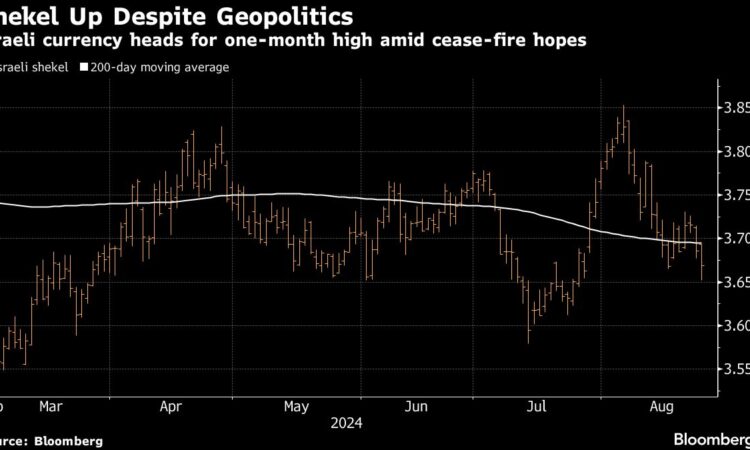
(Bloomberg) — Emerging market currencies traded mixed on Monday as Asian currencies caught up with a rally late Friday sparked by dovish comments by Federal Reserve Chairman Jerome Powell.
Most Read from Bloomberg
The Malaysian ringgit and Taiwan dollar were the top performers after Powell said after the close of trading in Asia on Friday that the time had come for rate cuts. Asian currencies lifted a gauge of emerging market currencies to its second straight session of gains. At the same time, many of their European and Latin American counterparts declined.
The Mexican peso led losses as traders turned to less risky options in case tensions escalate in the Middle East. Mexico’s President Andrés Manuel López Obrador is also pushing through his judicial reform, shrugging off criticism in a press conference on Monday and undermining investor confidence.
“Currency volatility is everywhere due to the great uncertainty, which has increased after the events of this weekend” in the Middle East, said Juan Perez, director of trading at Monex USA. “The situation in Mexico concerns us because of the radical changes that may come.”
The Colombian and Chilean currencies gained, supported by rallies in oil and copper, respectively.
The signal from Powell that the US is nearing the start of monetary easing means investors will now look for clues about the pace of reductions. Federal Reserve Bank of San Francisco President Mary Daly said in an interview with Bloomberg Television on Monday that it’s appropriate to begin cutting interest rates, but that it was too early to know the exact path of policy.
This months dovish turn at the Fed has helped push the emerging-market gauge to a record high.
“Even though global risk appetite has fully recovered, some currencies have lagged, including the Mexican peso,” BBVA strategists led by Alejandro Cuadrado wrote in a Monday note to clients. “Locally, the focus will be on Mexico’s reform agenda and Brazil’s fiscal and monetary policy.”
The Hungarian forint and the Polish zloty were among the worst performers on Monday, while the South African rand pared most of its losses in thin market liquidity due to a holiday in the UK.
Hungary’s central bank will hold a policy meeting on Tuesday, with most analysts in a Bloomberg survey expecting the base rate to remain unchanged at 6.75% following a surprisingly high inflation reading for July. Poland’s government is due to present its 2025 budget draft this week.
The Israeli shekel shrugged off rising tensions in the region, gaining almost 0.2% to the dollar amid signs that talks for a cease-fire in Gaza will continue.
On the equity side, emerging stocks also had a good day, with the benchmark index jumping as much as 0.8% before trimming its advance. The rise was driven by shares in communication, commodities and health-care companies.
Emerging stocks have lagged the gains in US equities this year as traders repeatedly pushed back their views on when the Fed will start reducing borrowing costs, which should boost the allure of riskier assets.
Elsewhere, Indonesian sovereign bonds were the best performers among emerging markets, according to a Bloomberg index. The rally came after Indonesia’s electoral commission published a regulation that ended any remaining chance for President Joko Widodo’s youngest son to run in November’s regional elections, the prospect of which contributed to widespread protests last week.
Most Read from Bloomberg Businessweek
©2024 Bloomberg L.P.
